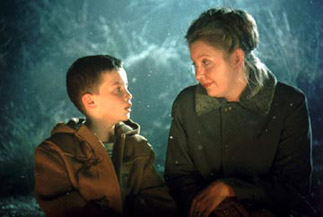|
|
Director's SpotlightDanny BoyleBy Joshua PaschFebruary 18, 2010
It is also worth noting that, while vastly different in tone and contextualization, Slumdog Millionare and the similarly titled Millions do share a common thematic thread. Slumdog explores the innocence of youth and how it can be corrupted in the search for material gain. Alternatively, Millions explores how, no matter how your intentions, that corruption can still take place after that wealth is achieved. As in his other features, Slumdog Millionaire has showy visuals made on a bare bones budget. The plot, while contrived and, on the surface, gimmicky, is woven together with such sublime energy that Boyle challenges the viewer not to be charmed by his rags-to-riches story. Told primarily through flashbacks, the movie tracks the young trio of Jamal, Salim, and Latika as they both overcome and succumb to life's various hardships. A summary of some of the plot points can hardly do the film's tone justice, and would probably make it sound like a depressing night at the movies. Somehow, though, Boyle infuses Jamal's journey with such pure, unadulterated energy and wonderment that it is hard not to love going along for the ride. Even as he must endure the loss of his mother, a betrayal from his older brother, and the capture of the love of his young life by a local crime lord, Jamal's life seems like an absolute adventure. It sounds insensitive, but against all odds, when it's over, it's easy to wonder what kind of exciting exploits you yourself might have experienced had you been raised in the lively Mumbai slums. At the very least you might want to dance in the aisles when the Bollywood-style dance number plays over the films closing credits.
|

|
|
|

|
Friday, November 1, 2024
© 2024 Box Office Prophets, a division of One Of Us, Inc.


